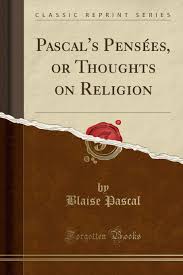Pensées Page #2
The Pensées is a collection of fragments on theology and philosophy written by 17th-century philosopher and mathematician Blaise Pascal. Pascal's religious conversion led him into a life of asceticism, and the Pensées was in many ways his life's work. The Pensées represented Pascal's defense of the Christian religion.
Genre: Religion, Spirituality & New Age
Genre: Religion, Spirituality & New Age
- Year:
- 1670
- 3,243 Views
He made a note of his mystical experience, which he kept always about him, and which was found, after his death, sewn into the coat which he was wearing. The experience occurred on 23 November, 1654, and there is no reason to doubt its genuineness unless we choose to deny all mystical experience. Now, Pascal was not a mystic, and his works are not to be classified amongst mystical writings; but what can only be called mystical experience happens to many men who do not become mystics. The work which he undertook soon after, the Lettres écrites à un provincial, is a masterpiece of religious controversy at the opposite pole from mysticism. We know quite well that he was at the time when he received his illumination from God in extremely poor health; but it is a commonplace that some forms of illness are extremely favourable, not only to religious illumination, but to artistic and literary composition. A piece of writing meditated, apparently without progress, for months or years, may suddenly take shape and word; and in this state long passages may be produced which require little or no retouch. I have no good word to say for the cultivation of automatic writing as the model of literary composition; I doubt whether these moments can be cultivated by the writer; but he to whom this happens assuredly has the sensation of being a vehicle rather than a maker. No masterpiece can be produced whole by such means; but neither does even the higher form of religious inspiration suffice for the religious life; even the most exalted mystic must return to the world, and use his reason to employ the results of his experience in daily life. You may call it communion with the Divine, or you may call it a temporary crystallisation of the mind. Until science can teach us to reproduce such phenomena at will, science cannot claim to have explained them; and they can be judged only by their fruits. From that time until his death, Pascal was closely associated with the society of Port-Royal which his sister Jacqueline, who predeceased him, had joined as a religieuse; the society was then fighting for its life against the Jesuits. Five propositions, judged by a committee of cardinals and theologians at Rome to be heretical, were found to be put forward in the work of Jansenius; and the society of Port-Royal, the representative of Jansenism among devotional communities, suffered a blow from which it never revived. It is not the place here to review the bitter controversy and conflict; the best account, from the point of view of a critic of genius who took no side, who was neither Jansenist nor Jesuit, Christian nor infidel, is that in the great book of Sainte-Beuve, Port-Royal. And in this book the parts devoted to Pascal himself are among the most brilliant pages of criticism that Sainte-Beuve ever wrote. It is sufficient to notice that the next occupation of Pascal, after his conversion, was to write these eighteen "Letters," which as prose are of capital importance in the foundation of French classical style, and which as polemic are surpassed by none, not by Demosthenes, or Cicero, or Swift. They have the limitation of all polemic and forensic: they persuade, they seduce, they are unfair. But it is also unfair to assert that, in these Letters to a Provincial, Pascal was attacking the Society of Jesus in itself. He was attacking rather a particular school of casuistry which relaxed the requirements of the Confessional; a school which certainly flourished amongst the Society of Jesus at that time, and of which the Spaniards Escobar and Molina are the most eminent authorities. He undoubtedly abused the art of quotation, as a polemical writer can hardly help but do; but there were abuses for him to abuse; and he did the job thoroughly. His Letters must not be called theology. Academic theology was not a department in which Pascal was versed; when necessary, the fathers of Port-Royal came to his aid. The Letters are the work of one of the finest mathematical minds of any time, and of a man of the world who addressed, not theologians, but the world in general--all of the cultivated and many of the less cultivated of the French laity; and with this public they made an astonishing success.
Translation
Translate and read this book in other languages:
Select another language:
- - Select -
- 简体中文 (Chinese - Simplified)
- 繁體中文 (Chinese - Traditional)
- Español (Spanish)
- Esperanto (Esperanto)
- 日本語 (Japanese)
- Português (Portuguese)
- Deutsch (German)
- العربية (Arabic)
- Français (French)
- Русский (Russian)
- ಕನ್ನಡ (Kannada)
- 한국어 (Korean)
- עברית (Hebrew)
- Gaeilge (Irish)
- Українська (Ukrainian)
- اردو (Urdu)
- Magyar (Hungarian)
- मानक हिन्दी (Hindi)
- Indonesia (Indonesian)
- Italiano (Italian)
- தமிழ் (Tamil)
- Türkçe (Turkish)
- తెలుగు (Telugu)
- ภาษาไทย (Thai)
- Tiếng Việt (Vietnamese)
- Čeština (Czech)
- Polski (Polish)
- Bahasa Indonesia (Indonesian)
- Românește (Romanian)
- Nederlands (Dutch)
- Ελληνικά (Greek)
- Latinum (Latin)
- Svenska (Swedish)
- Dansk (Danish)
- Suomi (Finnish)
- فارسی (Persian)
- ייִדיש (Yiddish)
- հայերեն (Armenian)
- Norsk (Norwegian)
- English (English)
Citation
Use the citation below to add this book to your bibliography:
Style:MLAChicagoAPA
"Pensées Books." Literature.com. STANDS4 LLC, 2024. Web. 18 Apr. 2024. <https://www.literature.com/book/pens%C3%A9es_114>.




Discuss this Pensées book with the community:
Report Comment
We're doing our best to make sure our content is useful, accurate and safe.
If by any chance you spot an inappropriate comment while navigating through our website please use this form to let us know, and we'll take care of it shortly.
Attachment
You need to be logged in to favorite.
Log In